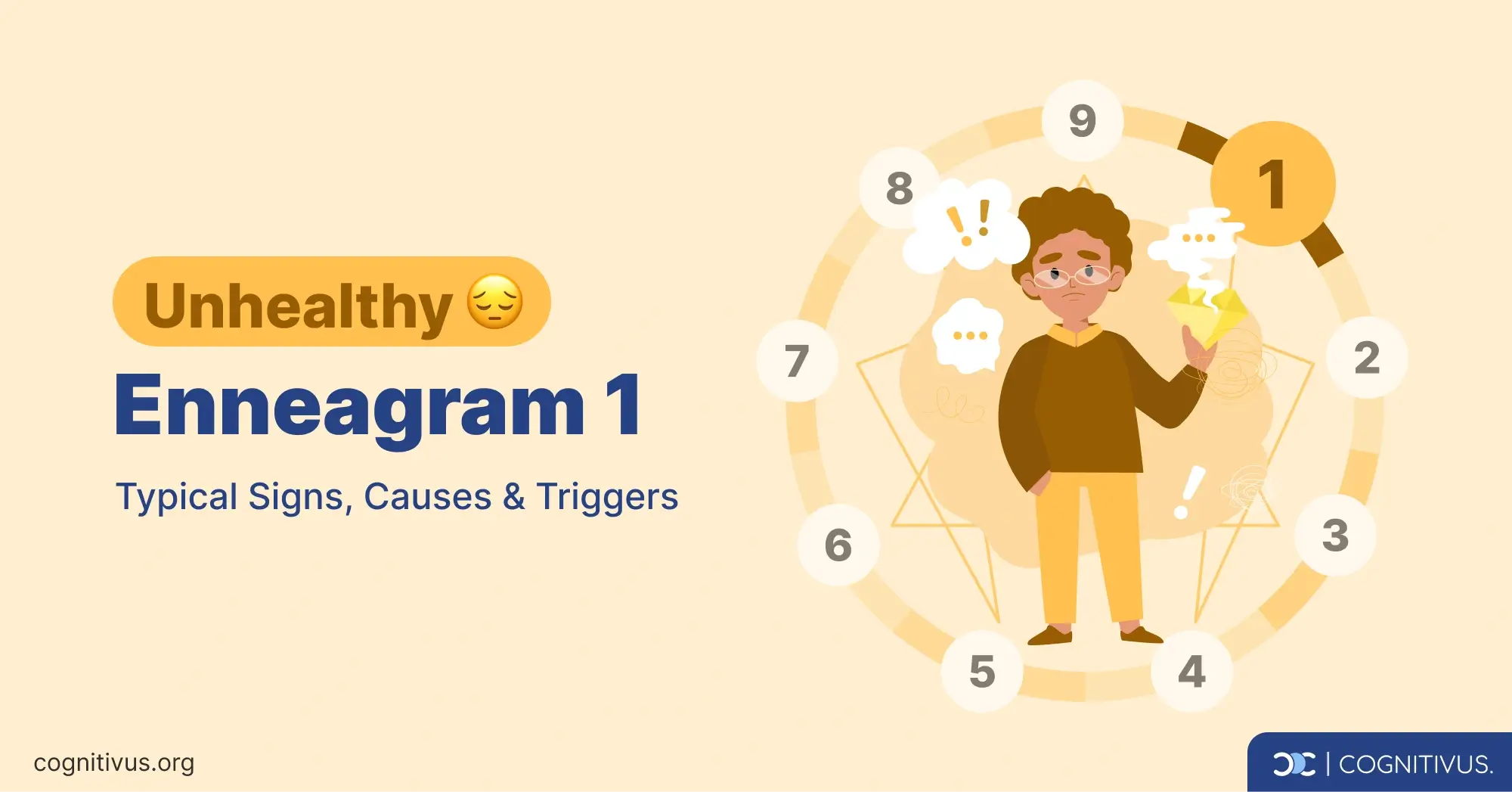Enneagram Type 1, often called "The Perfectionist," has a strong desire for things to be done the “right” way, with a focus on integrity, order, and improvement.
At unhealthy levels, this drive can spiral out of control, leading to a whirlwind of stress and negative patterns that affect both personal and professional areas of life. Understanding these behaviours is the first step to growing into a healthier mindset, also helping individuals foster personal growth and improve relationships.
In this article, we’ll dive into the common signs of an unhealthy Type 1, the triggers behind these behaviours, and steps they can take to develop a healthier mindset.
Enneagram Type 1: A Quick Overview
Type 1s, often referred to as "The Reformer" or "The Perfectionist," are motivated by a strong internal drive to do things correctly. They value responsibility, fairness, and living by high ethical standards. This inner compass pushed them to not only improve themselves but also the world around them. Their greatest fear is being seen as flawed or morally wrong, which can cause them to become fixated on correcting mistakes.
When they are in a healthy place, Type 1s are dedicated, balanced, and motivated by a sense of justice to make a meaningful impact. However, when stress hits, they can become overly judgemental, rigid, and controlling. Instead of being constructive, their perfectionism may turn into harsh criticism of both themselves and others, which often leaves them frustrated, dissatisfied, and burnt out.
When healthy, Type 1s take on the optimism and spontaneity of Type 7, allowing them to embrace flexibility and life’s imperfections. But in an unhealthy state, they may slip into the negative traits of Type 4, becoming more self-critical, emotionally burdened, and isolated.
10 Common Signs of an Unhealthy Enneagram Type 1
Here are some key indicators that suggest a Type 1 is in a tough spot:
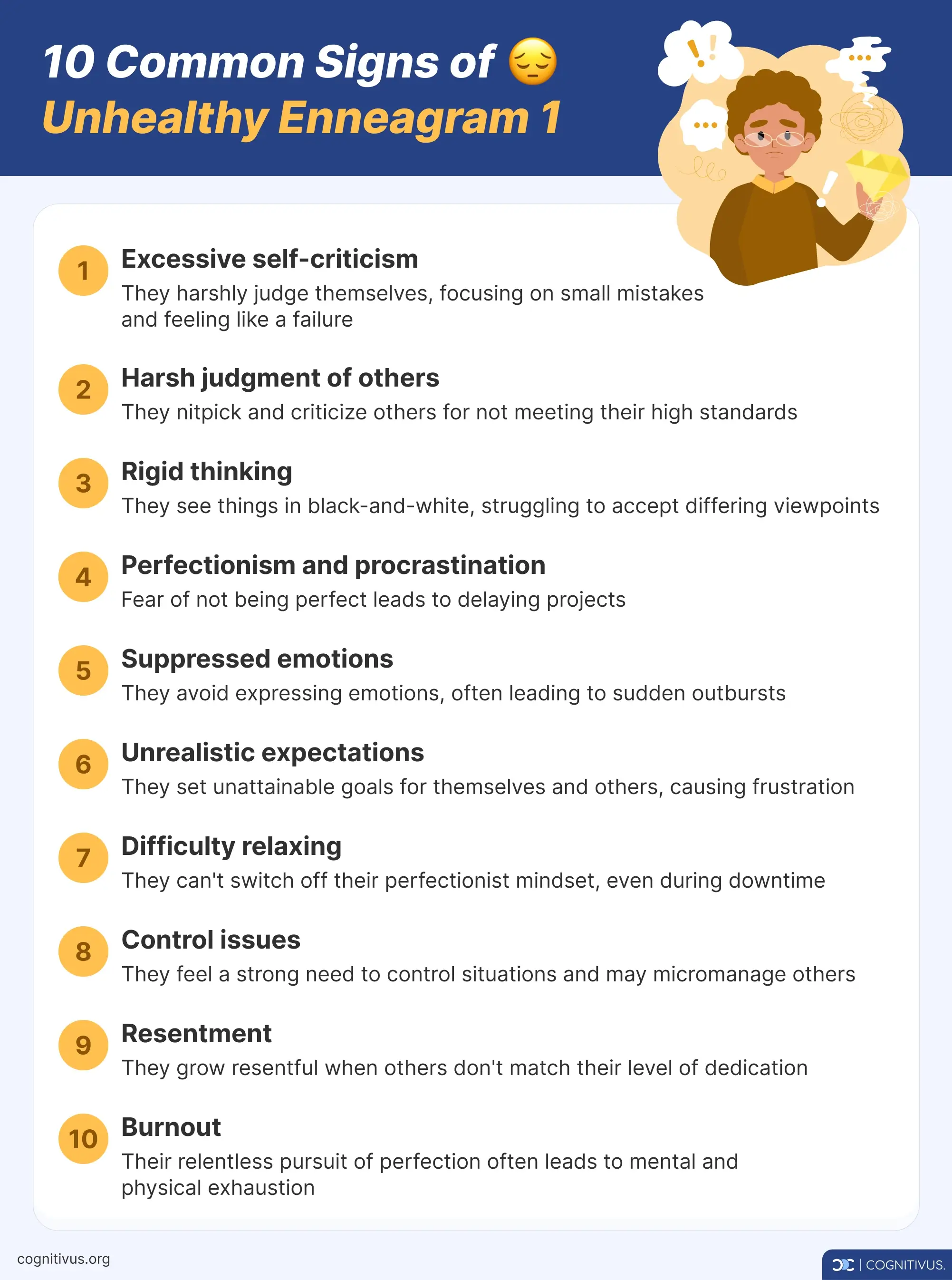
1. Excessive self-criticism
Unhealthy Type 1s can be their own worst enemy; they have an inner critic that constantly points out their mistakes and imperfections. This relentless self-judgement can leave them feeling anxious, frustrated, and never good enough. For example, if a Type 1 doesn’t perform perfectly at work and messes up on a presentation, they won't just shrug it off. Instead, they’ll dwell on the smallest errors, feeling like they’ve failed entirely.
2. Harsh judgement of others
That critical nature doesn’t stop with themselves; it spills over onto others too. An unhealthy Type 1 might find themselves nitpicking at their friends or coworkers, judging them for not meeting the same high standards they hold themselves to. Imagine someone constantly correcting your grammar, your decisions, or the way you perform tasks. This judgemental behaviour can strain relationships, as Type 1s often feel frustrated by others’ perceived lack of effort or morality, and the people around them feel like they can't do anything right.
3. Rigid thinking
Unhealthy Type 1s may see the world in black-and-white terms– there is only right and wrong, and no grey areas. Flexibility isn't exactly their strong suit. So, this rigid mindset makes it difficult for them to accept alternative viewpoints or compromise. For instance, in a group project, an unhealthy Type 1 may struggle to accept others’ ideas, believing that their way is the only correct method.
4. Perfectionism and procrastination
Ironically, their obsession with perfection often causes them to put things off. The fear of not getting it just right can make them hesitate to start projects at all, paralysed by the pressure of making mistakes. It's like a student who doesn’t turn in an assignment because they couldn’t make it perfect, or an employee who hesitates to begin a presentation because it isn’t flawless.
5. Suppressed emotions
Type 1s often suppress their feelings, believing that their emotions are a distraction from their duties, so they may avoid expressing vulnerability, viewing it as a weakness. This suppression can lead to emotional outbursts as their bottled-up frustrations eventually spill over. So although a Type 1 might seem calm and composed, they can snap unexpectedly when they feel overwhelmed by stress or disappointment.
6. Unrealistic expectations
It is common for Type 1s to set unattainable standards for themselves and others. They might expect perfection in every aspect of life, from relationships to work, which often leads to feelings of frustration and disappointment. This constant striving for an unreachable ideal often leaves them feeling exhausted and let down.
7. Difficulty relaxing
Even during downtime, Type 1’s perfectionist mindset does not switch off. They may find it difficult to relax, as their minds are often occupied with thoughts of what still needs to be done or what could be improved. Instead of enjoying a day off, they might get stuck worrying about unfinished tasks or feeling guilty about taking a break.
8. Control issues
Unhealthy Type 1s often feel the need to control situations to ensure everything goes according to their standards. This need for control can make them inflexible and intolerant of any deviations from their plans. For instance, they might micromanage a team or insist on doing tasks themselves to ensure they are done "the right way."
9. Resentment
When Type 1s feel like others aren’t as dedicated or responsible as they are, they can become resentful. They might feel that they are carrying the weight of responsibility while others get away with being careless or lazy. This resentment builds up over time, causing strain in both personal and professional relationships.
10. Burnout
The constant and relentless drive to be perfect can eventually take its toll on Type 1s, leading to burnout. They often push themselves to the edge by always working, improving, or fixing something. This pressure can result in exhaustion, both mentally and physically, leaving them feeling drained and incapable of maintaining their high standards.
Impact of the Wings on an Unhealthy Enneagram Type 1
The wings of an Enneagram Type 1– Type 9 (The Peacemaker) and Type 2 (The Helper) – significantly influence how unhealthy behaviours manifest in different ways. These Enneagram wings can either amplify certain traits or create new challenges for Type 1s when they are struggling.
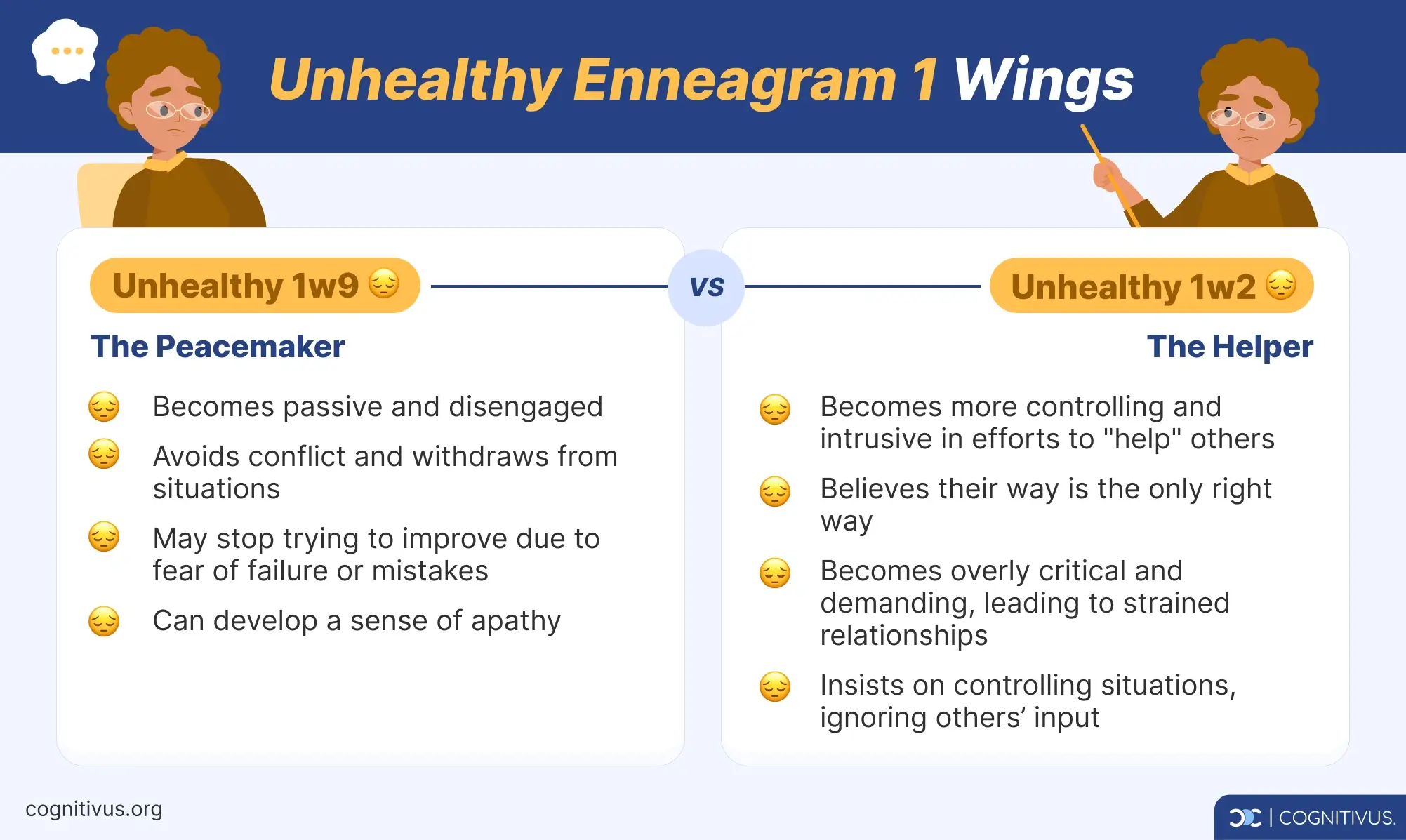
Unhealthy 1w9
An unhealthy Type 1 with a 9 wing may become more passive and disengaged. While they still hold onto their strict ideals, they may shy away from conflict and start avoiding it altogether. Instead of addressing problems head-on, they may withdraw, becoming indifferent to situations that normally trigger their perfectionist drive. This can lead to a sense of apathy, where they stop trying to improve things because they fear failure or making mistakes. For example, an unhealthy 1w9 might avoid taking on leadership roles at work, not because they don't care, but because they’re too anxious about not meeting their own high standards.
Unhealthy 1w2
On the other hand, an Enneagram Type 1 with a 2 wing, when at unhealthy levels, may become more controlling and intrusive in their efforts to "help" others, similar to unhealthy 2s. They believe their way is the only right way, and in their drive to fix situations or people, they may become overly critical or demanding. Their desire to be helpful can quickly turn into a need to control. This can strain relationships, as others feel judged or micromanaged by their well-intentioned but overbearing behaviour. For instance, an unhealthy 1w2 might insist on organising every detail of a family event, all while ignoring others’ input or preferences. They believe they are being helpful, while other individuals do not feel like they are being heard.
Causes and Triggers
The drive to be perfect and always do the "right thing" is not without its pressures, both from the outside world and from within. When these pressures accumulate, they can lead to unhealthy behaviours. Let’s explore some common causes and triggers that contribute to the stress and rigidity seen in unhealthy Type 1s.
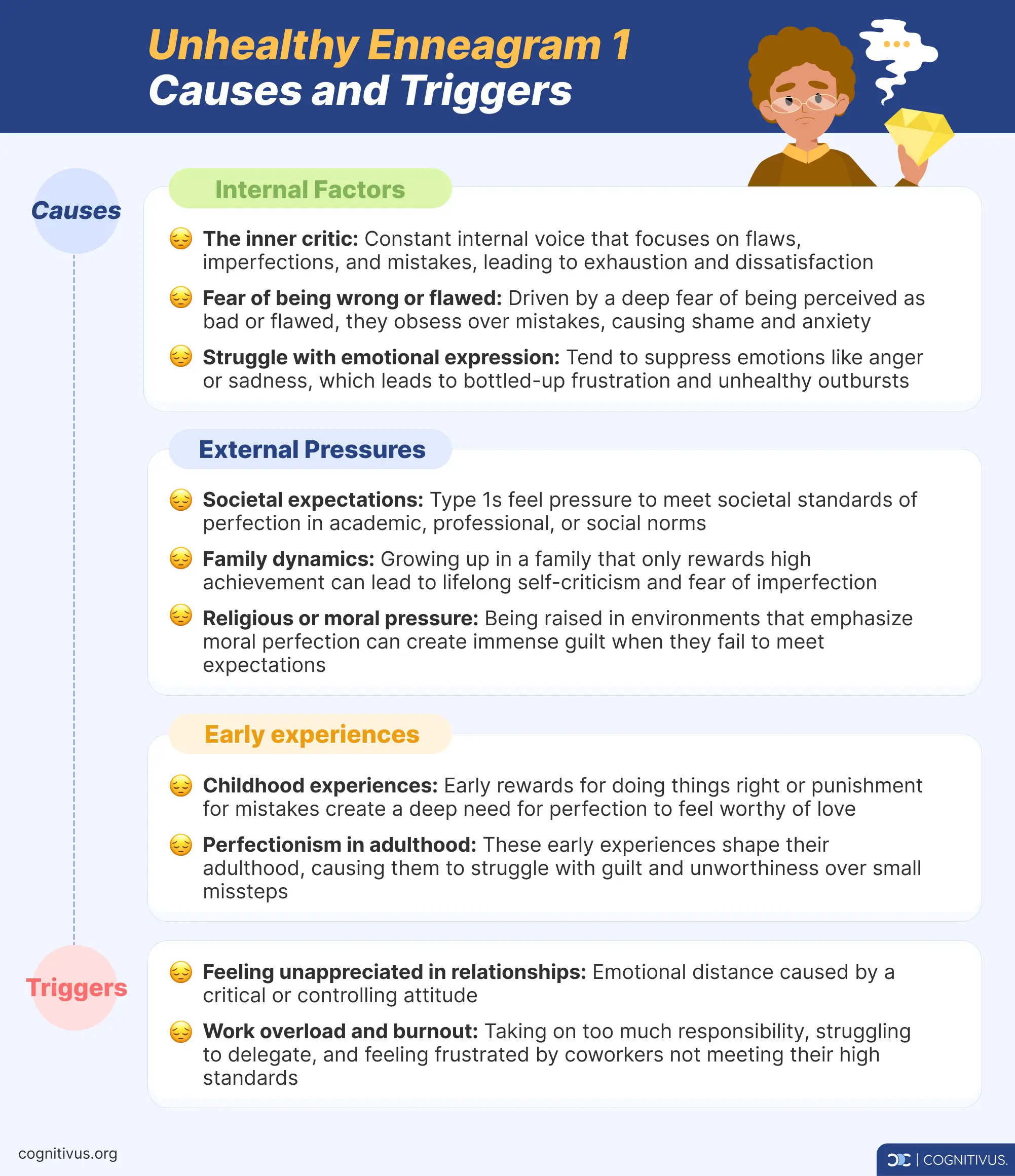
External pressures
- Societal expectations: Many Type 1s grow up in environments where perfection is highly valued and praised. If society places a strong emphasis on following rules, achieving high academic or professional success, or behaving according to rigid social norms, Type 1 will feel the need to meet these standards. They strive to appear faultless, worried that if they slip up, they’ll be judged or seen as not good enough.
- Family dynamics: For some Type 1s, the pressure to be perfect starts at home. If they grew up in a family where only the highest achievements were celebrated, or where mistakes were met with harsh criticism, it can shape how they see themselves. This leads them to become highly self-critical, which follows them even into adulthood. For instance, it's easy to imagine a child who only received praise for getting straight As or being obedient growing into an adult who feels worthless when they fall short of perfection; they internalise the belief that anything less than perfection is unacceptable.
- Religious or moral pressure: Type 1s often have a strong sense of right and wrong, which can be intensified in religious or moral environments that emphasise sin, punishment, or righteousness. If they grew up in a faith that puts a lot of emphasis on moral perfection, even tiny mistakes can feel like major failures. This drive to be “good” can weigh heavily on them, creating immense guilt and stress when they inevitably fall short of these standards.
In all of these cases, the external pressures push Type 1s into a rigid mindset where they become hypercritical, not just of themselves but of everything around them. This constant need to control and perfect can lead to burnout or emotional exhaustion.
Internal factors
- The Inner critic: Type 1s have a relentless inner critic – a voice inside their head that constantly reminds them of their flaws, imperfections, and mistakes. It is harsh, unforgiving, holds them to incredibly high standards, and is never satisfied with “good enough.” Even after achieving something significant, they might only focus on the tiny details that went wrong or the areas where they could’ve done better. It’s exhausting and wears them down over time, leading to chronic dissatisfaction and frustration.
- Fear of being wrong or flawed: At their core, Type 1s are terrified of being perceived as "bad," flawed, or corrupt. This fear drives them to try to be perfect in everything- their work, their behaviour, their relationships. Even a minor mistake can trigger intense feelings of shame or guilt, like missing a deadline or making a tiny error at work, which might feel like a full-blown crisis to them. They can feel overwhelming anxiety or panic, far beyond what the situation actually warrants. They obsess over details, hoping to avoid that sense of failure, but it often leads to even more stress and burnout.
- Early childhood experiences: Many Type 1s report that their perfectionism stems from early childhood experiences, where they were rewarded only for doing things "right" or were harshly punished for making mistakes. As mentioned before, these formative experiences can create deep-seated beliefs that they are only worthy of love and acceptance when they perform perfectly. This can stick with them into adulthood, where even minor missteps can trigger a deep sense of guilt or unworthiness.
- Struggle with emotional expression: Emotions can be difficult for Type 1s. They often bottle up their feelings, seeing them as distractions or signs of weakness that could get in the way of their duties or their need to be “good.” Anger, sadness, and vulnerability all tend to be pushed down. But, these feelings don't just disappear; this emotional suppression can lead to pent-up frustration and resentment, eventually manifesting in unhealthy outbursts or emotional detachment.
All these internal factors create a storm inside Type 1s, constantly wrestling with their own expectations and judgements. It’s this battle between wanting to be perfect and the reality of being human that makes mistakes.
Impact on Personal and Professional Life
- Relationships: Unhealthy 1s can come off as overly critical and controlling, pushing loved ones away with their need to correct everything. This can cause strain, as others may feel judged or inadequate, leading to emotional distance. It is very easy for Type 1s to feel isolated and misunderstood here.
- Work: In the workplace, they may struggle to delegate tasks, insisting that only they can complete the work correctly. This can lead to inefficiency and burnout, as they take on more than they can handle while also criticising coworkers for not meeting their exacting standards.
Path to Healing and Growth
The journey to a healthier mindset starts with self-awareness and a willingness to let go of the need for everything to be perfect. Here are a few steps that can help Type 1s grow:
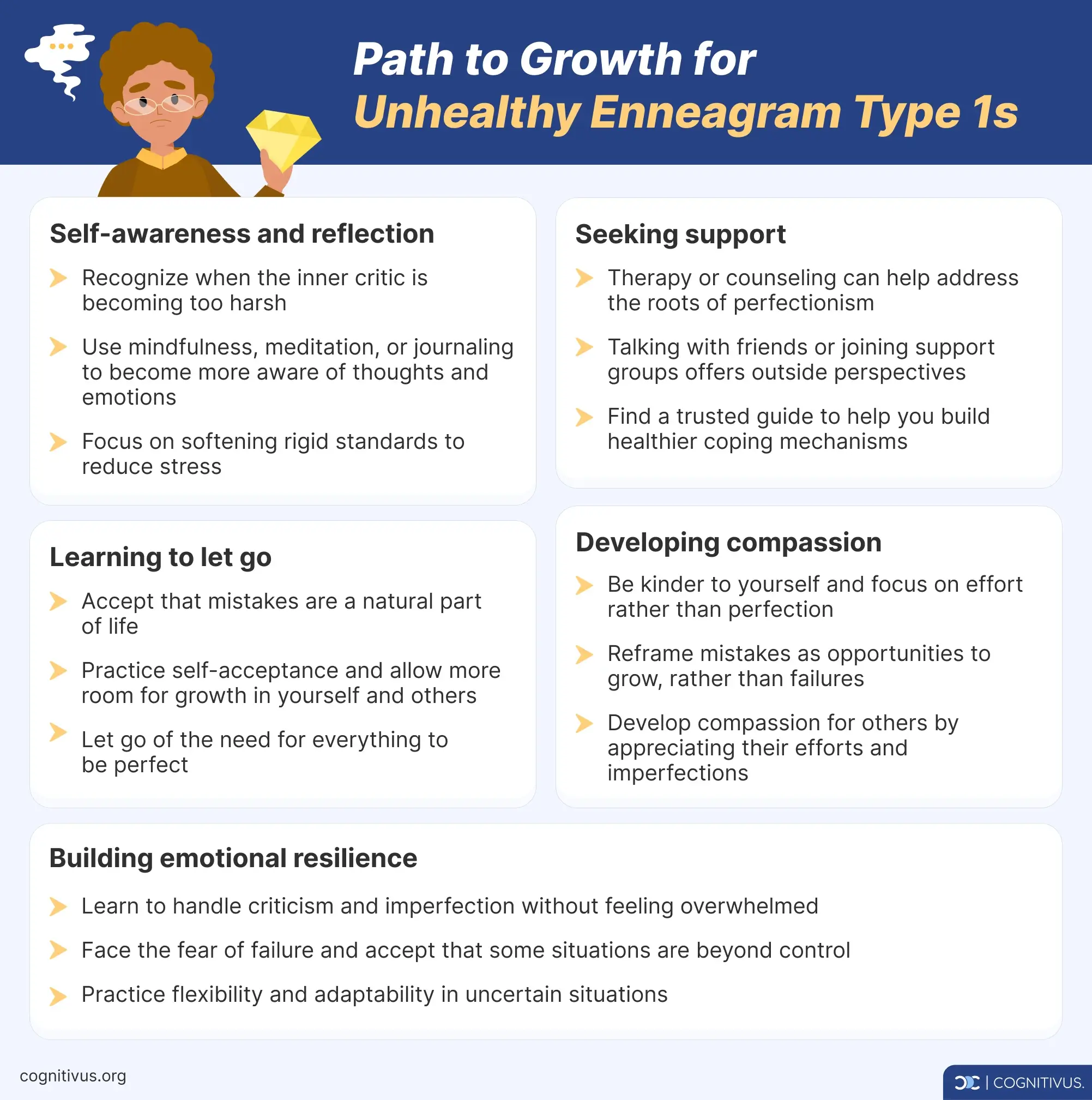
1. Self-awareness and reflection
Type 1s need to cultivate self-awareness by recognising when their inner critic is taking over. Practices like mindfulness, meditation, or journaling can help them become more aware of their thoughts and feelings, allowing them to soften their rigid standards.
2. Learning to let go
A key step in growth for Type 1s is learning to accept that not everything has to be perfect. By practising acceptance and understanding that mistakes are part of life, Type 1s can learn to relax and allow themselves (and others) more room to grow.
3. Seeking support
Therapy or counselling can be a game changer for Type 1s. A therapist can guide them in understanding the roots of their perfectionism and help them develop healthier ways to cope with their fear of making mistakes. Support groups or talking with trusted friends can also offer valuable insights and help support a Type 1 on their path to self-acceptance.
4. Developing compassion
One of the most critical areas of growth for Enneagram 1s is developing compassion. Learning to be kinder to themselves and others can soften the critical edge that often defines an unhealthy Type 1. For example, instead of criticising themselves for not completing a task perfectly, they can try reframing the situation by focusing on the effort they put in and the lessons learned. They need to remind themselves that no one is perfect and that being human means making errors and learning from them.
5. Building emotional resilience
Type 1s can benefit greatly from building emotional resilience, which involves learning to handle criticism and imperfection without becoming overwhelmed. This might mean facing their fear of failure head-on and learning to accept that not every situation can be controlled or made perfect. By practising emotional resilience, Type 1s can become more flexible and adaptable, allowing them to handle life’s uncertainties with more grace.
For example, a Type 1 might start small by intentionally allowing themselves to make a minor mistake, like sending an email with a small typo. Over time, exposing themselves to these “imperfect” moments can help them realise that the world doesn’t end when everything isn’t flawless.
Conclusion: Moving Toward a Healthier Enneagram Type 1
While unhealthy Type 1s can struggle with perfectionism, criticism, and rigidity, they also have the potential to grow into balanced, compassionate individuals. By recognising their unhealthy tendencies and working to overcome them, Type 1s can achieve a more peaceful and fulfilling life.
The path to growth is all about embracing imperfections, both in themselves and in the world around them. As they learn to soften their judgement and build self-compassion, Type 1s can move from a rigid state of mind to one that’s more open, accepting, and at peace.

